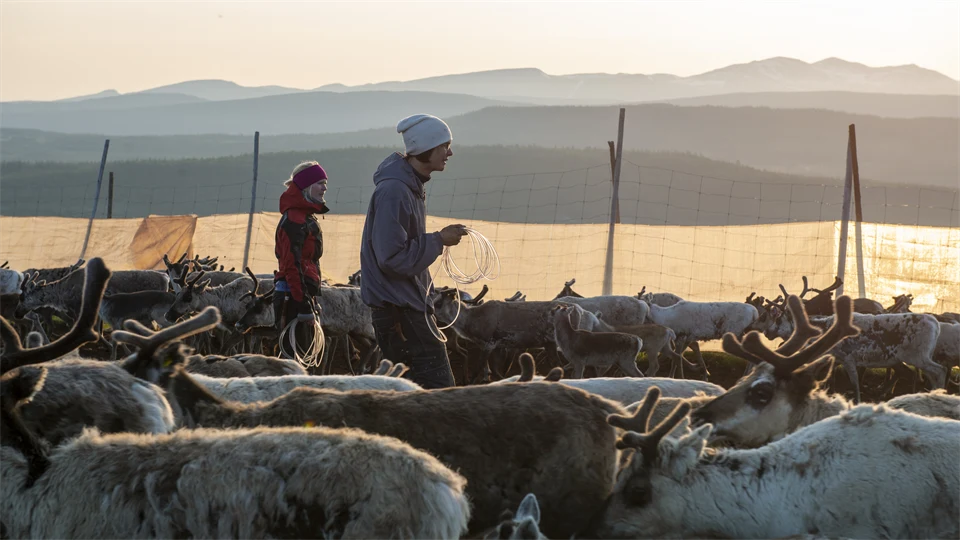Sámi norm systems and Sámi law: a challenge for existing national governance systems and legislation?
The project is based on the recognition of indigenous peoples' right to self-determination in international law and the opportunity for indigenous peoples to be able to develop their own norms and legal systems.
Background
In a recent court case, the Girjas case 2020, the Supreme Court also highlights the importance of Sami norm systems and traditional ways of using the land to understand Sami rights to land and natural resources, something that could be summarized as a Sami legal system alongside the Swedish one. However, what such a Sámi legal system could entail, which sources of law should be invoked, or analyzed, is still unclear. In order to understand the meaning and scope of the indigenous Sami people's right to land, natural resources and their own political institutions, the meaning of Sami law therefore needs to be clarified and a new theoretical, methodological and legal understanding of what can constitute a Sami legal system develop. The fact that culturally diverse societies contain parallel legal systems is previously accepted in the British Commonwealth states of Canada, New Zealand and Australia, where the relationship between "settler law" and "indigenous law" has developed into a separate theoretical and empirical field of research. This project is the first to study this relationship in a Nordic context.
Purpose
The aim of the project is twofold: firstly, to reconstruct and revitalize Sámi norm systems and to analyse the meaning of Sámi law, with a particular focus on the distribution and use of land and natural resources, and conflict management; Secondly, to analyse how Sámi law can come into conflict with and challenge national legislation and existing political institutions.
The project constitutes a genuine contribution of high scientific relevance, partly by developing theoretical concepts of what Sámi legal conceptions are and methodological tools for analysing Sámi norm systems, and partly by analysing how Sámi legal systems can be understood in relation to the national legal and political systems in Sweden and Norway. The project thereby contributes to the internationally emerging field of research in political theory and jurisprudence on indigenous peoples' right to self-determination.
In relation to the UN's Sustainable Development Goals, SDGs 15 and 16 are in particular in focus in this project: "protect , restore and promote the sustainable use of terrestrial ecosystems, sustainably manage forests, combating desertification, halting and reversing land degradation and halting biodiversity loss" and " promoting peaceful and inclusive societies for sustainable development, providing access to justice for all, and building effective and inclusive institutions with accountability at all levels".
Objective
The ability of indigenous peoples to make decisions about their own collective future and to govern themselves in accordance with their own norms and laws is an essential part of indigenous peoples' right to self-determination (Coyle 2020). Of paramount importance in this context is the UN Declaration on the Rights of Indigenous Peoples (UNDRIP), adopted in 2007. UNDRIP reflects in many ways customary international law on the rights of indigenous peoples (Diergarten 2019).
In many ways, indigenous self-determination challenges a traditional nation-state-centered understanding of territorial jurisdiction, democracy, and political rights (Mörkenstam 2019; Scheinin & Åhrén 2018). However, UNDRIP highlights a dilemma regarding the extent to which it is possible for indigenous peoples who have been subjected to colonization and assimilation for a long time to formulate and gain respect for their own norms and laws (Nilsson 2019, 2021).
The goal of this project is twofold: first, to reconstruct and revitalize Sámi norm systems and to analyze the meaning of Sámi law, with a particular focus on (i) the distribution and use of natural resources and territories, and (ii) conflict management. Norm systems can be seen as perceptions that structure society.
However, the definition of norms within the Sámi community needs to be further addressed, which requires the development of a theoretical and methodological research framework. Second, the aim is to analyze how Sámi norm systems and law can challenge existing Swedish and Norwegian laws and governance systems, and present recommendations on how they can be implemented in a reciprocal and respectful way to promote sustainable governance models for natural resources and territories.
Project organization
The project is a collaboration between three research environments with expertise in Sámi culture, law and rights of origin: Department of Political Science, Stockholm University (SU); INSARC, the Silver Museum in Arjeplog (INSARC); Faculty of Law, UiT – The Arctic University of Norway (UiT).
The project manager is Ulf Mörkenstam, Professor of Political Science at SU. He has been in charge of four projects with a special focus on Sami politics and rights of origin. The research group also includes Malin Brännström, who is a Sami legal researcher and director of the research institute INSARC. INSARC is an organization that conducts interdisciplinary research on the historical and current relationship between people and landscapes in Sápmi. She specializes in Sámi land rights and how national law handles land use conflicts. Kristina Labba is a Sámi associate professor of law at the Faculty of Law, UiT. She has Northern Sámi as her mother tongue and specializes in Sámi reindeer herding law. Ragnhild Nilsson, Senior Lecturer in Political Science at Mid Sweden University. She is a South Sami researcher with expertise in Swedish Sami politics.

